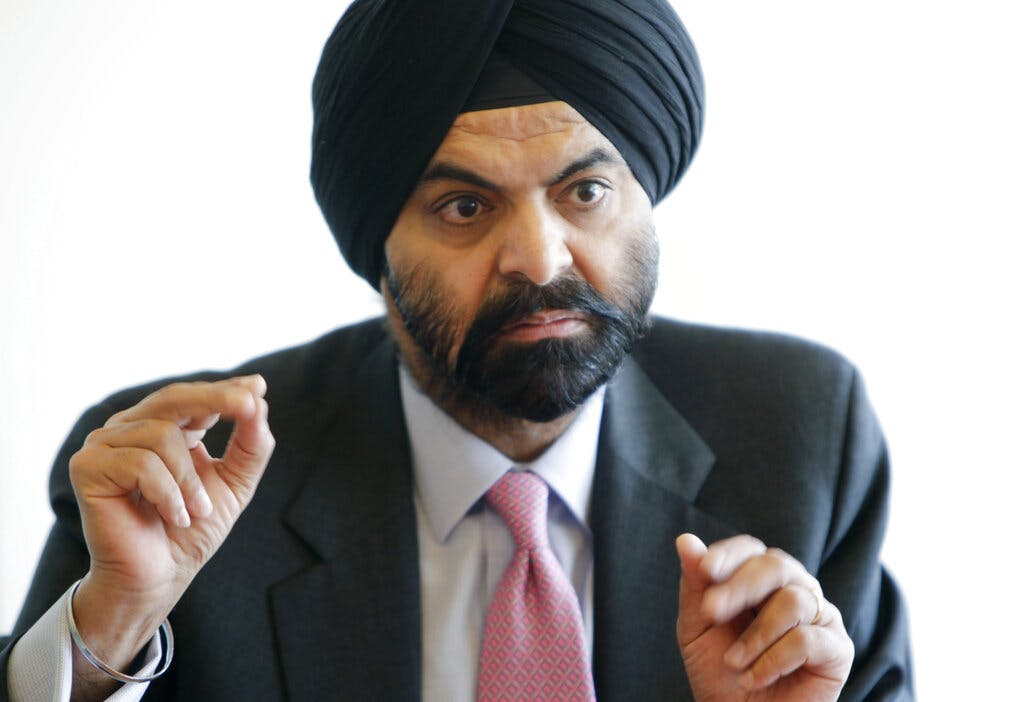Biden Seeks To Redirect World Bank Toward Climate Change With New Nominee
The climate lobby is pushing for reforms at the bank that will allow it to stray from its original mission of alleviating poverty and focus more on addressing climate change.

President Biden nominated a former CEO of credit card giant MasterCard now leading a private equity firm to head the World Bank following the resignation under pressure of its previous, Trump-appointed boss after he expressed skepticism about the science behind climate change.
Mr. Biden nominated Ajay Banga, who was born and raised in India and is now vice chairman at General Atlantic. Mr. Banga served in various roles at MasterCard over the last 30 years, as well as on the boards of the American Red Cross, Dow, and Kraft Foods.
“Ajay is uniquely equipped to lead the World Bank at this critical moment in history,” Mr. Biden said in a statement, adding that Mr. Banga “has critical experience mobilizing public-private resources to tackle the most urgent challenges of our time, including climate change.”
A statement from the treasury secretary, Janet Yellen, praising the nomination was laden with liberal buzzwords and highlighted Mr. Banga’s past work advocating for diversity and inclusion. The word climate appeared three times in the 291-word statement.
“Ajay Banga understands that [the bank’s] core objectives are deeply intertwined with challenges like meeting ambitious goals for climate adaptation and emissions reduction, preparing for and preventing future pandemics, and mitigating the root causes and consequences of conflict and fragility,” the statement read.
America has traditionally chosen the head of the World Bank, deferring to Europe to select a boss for the International Monetary Fund. Critics of both of those traditions have called for an end to the arrangement and more voices from the developing world at the organizations.
The World Bank’s current president, David Malpass, whose four-year term was due to expire in April 2024, announced last week that he would be stepping down in June. Mr. Malpass drew the ire of climate change alarmists both within and outside the Biden administration last September when he expressed skepticism about the role of humans and fossil fuels on the planet’s evolving climate. Al Gore tarred him with the most heinous slur that can be leveled in climate circles: “climate denier.”
Mr. Malpass attempted to walk back his comments and apologized, but many of the bank’s 189 member nations — especially in Europe — seized on his ambivalence as proof that the bank is not sufficiently focused on climate change. The bank’s stated goals through the entirety of its 78-year history have been to finance projects aimed at reducing poverty and boosting development in the world’s low- and middle-income countries.
Mr. Malpass’s departure gave the climate lobby the opportunity to push for changes that will allow it to stray even further from its original mission and focus more on financing green energy and renewable resources projects in the developing world. Expanding that remit is expected to come with significant cost increases that its member nations — especially its largest shareholder, America — will need to pay for, a prospect that could prove challenging with climate-skeptical and spending-averse Republicans in control of the House of Representatives.
Just how much ground Mr. Banga is willing to concede to Ms. Yellen and others encouraging this evolution should become clearer during the bank’s annual spring meeting in April. The bank itself said Thursday that nominations will continue to be accepted through March 29, after which it will decide on the new president via “an open, merit-based and transparent selection process.”
In a statement, Mr. Biden’s climate envoy, John Kerry, said Mr. Banga is the right choice at the right time for the bank.
“The climate crisis requires new thinking and creative vision regarding finance, so that we can meet the challenge of the energy transition,” Mr. Kerry said. “He can help put in place new policies that help deploy the large sums of money necessary to reduce global emissions and help developing and vulnerable countries adapt, build resilience, and mitigate the impact of greenhouse gases.”

